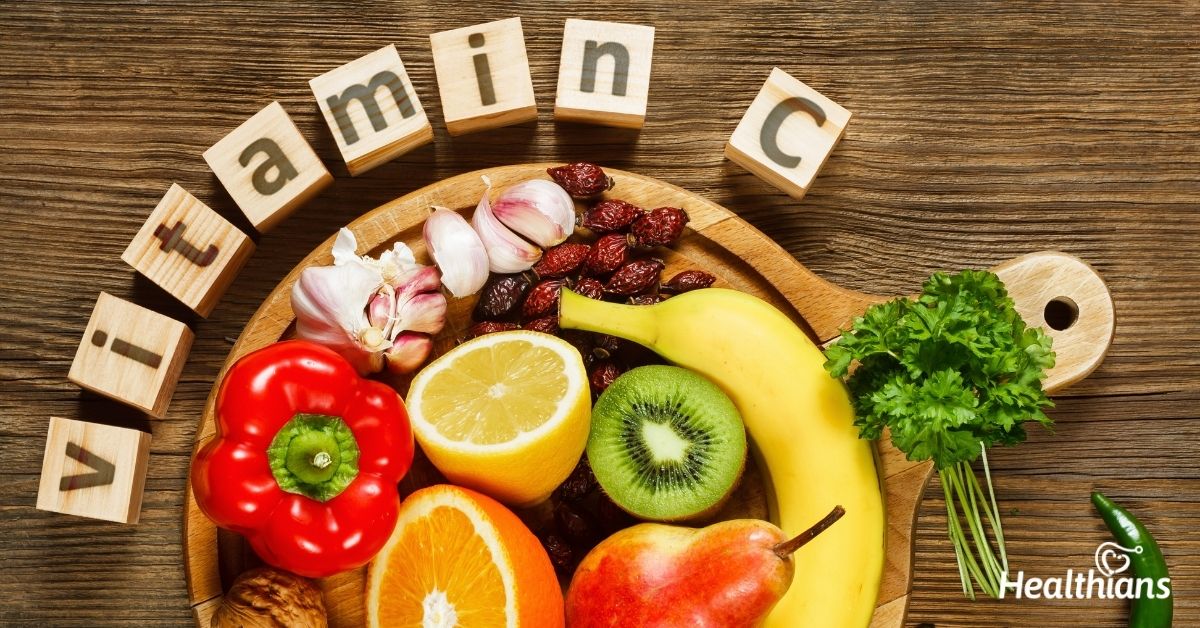Contributed by -Healthians Team
A fun fact: Our bodies have all the necessary genes to make Vitamin C. But many, many, MANY years ago, due to mutation, they became non-functional and our ancestors probably ate so much fruit that the body actually gave up producing its own vitamin C.
If your skin is rough and bumpy and your wounds take a lot of time to heal, then take this as a sign of vitamin C deficiency. Although it can be prevented with some basic lifestyle changes and a balanced diet, many of us still neglect these signs. To prevent some serious complications that may possibly develop over time, it’s better to take some action now. So here, let’s talk about vitamin C deficiency – from what it is to what you can do about it.
What is Vitamin C and why is it important?
Vitamin C is a water-soluble vitamin. That means, it dissolves in water and whatever is not absorbed by the body moves out through the urine. As your body is not storing any vitamin C, you need to consume it daily. Otherwise, the lack of it will lead to vitamin C deficiency which can further lead to various health consequences (discussed later in the article).
You need vitamin C because it promotes the growth and repair of tissues in your body. It plays a major role in the production of collagen that is the main component of fibrous tissues like tendons, ligaments, skin, cornea, cartilage, bone, gut, and blood vessels. Vitamin C is also one of the many antioxidants that can keep you safe from cancer, heart diseases, and conditions like arthritis.

Causes of vitamin C deficiency?
The recommended dietary allowance of vitamin C for healthy adults is 40 milligrams per day. If your daily intake is less than what has been recommended, then you’re at the risk of developing vitamin C deficiency. Besides, the following factors can also put you at the risk of vitamin C deficiency:
- Smokers or those exposed to second-hand smoke.
- Infants who are fed boiled milk or evaporated milk instead of breast milk.
- Those with malabsorption or medical conditions where absorption of vitamin C decreases or its need increases.
- Individuals with limited food variety such as elderly, alcohol abusers, or children.
What are the symptoms of Vitamin C deficiency?
Severe symptoms of vitamin C deficiency may take months to develop. However, there are some subtle signs that could indicate the deficiency.
- Rough, bumpy or ‘chicken’ skin
- Dry and wrinkly skin
- Bent or coiled body hair
- Red spots around hair follicles
- Spoon shaped fingernails or red lines or spots in the nail bed
- Easy bruising and appearance of purple dots under the skin
- Slow healing of the wounds
- Severe joint pains
- Red, swollen and bleeding gums
- Poor immunity
- Persistent iron deficiency
- Fatigue
What are the consequences of Vitamin C deficiency?
Scurvy is a disease that is the result of vitamin C deficiency persisting for a long time. Symptoms of vitamin C deficiency worsen in it. There might be bleeding under the skin, gums might become spongy and wounds might heal extremely slowly. The person with scurvy may look pale and feel depressed. If not treated or the disease progresses, loss of teeth can happen and bone abnormalities might develop as well.
[Also read – Guidebook to manage Vitamin D deficieny]
Understanding test reports
Getting a vitamin C blood test is always advisable before resolving to make strict changes in your diet and lifestyle. The table below will help you understand your results and plan the future course of action.
| NAME | REFERENCE RANGE |
| Vitamin C (Ascorbic Acid) | 0.6 – 2 mg/dl |

Lifestyle recommendation
To maintain or improve your vitamin C levels you need to improve your diet. Although vitamin supplements can save you from severe consequences, an unhealthy diet is always the main culprit which may lead to other health issues in the long run. If you look at the bigger picture, improving your diet can do wonders for you. The list of vitamin C rich food is pretty long. That means you have a lot of options and ways to add them to your diet.
Some of the vitamin C rich foods are:
- Orange
- Strawberry
- Papaya
- Lychee
- Lemon
- Broccoli
- Kiwi
- Kale
- Parsley
- Blackcurrant
- Guava
- Chilli pepper
- White potato
- Sweet potato
- Watermelon
- Mango
Here are some ways that you can try to add more and more vitamin C rich food to your diet:
- Always keep cut-up fruits and vegetables ready and handy for a quick snack.
- Add shredded broccoli, lettuce and tomatoes to your sandwiches, rolls and wraps.
- Frozen fruit slices could be great for summers.
- Vegetable juice could be a filling low-calorie snack.
- Whenever possible eat your vegetables raw.
- Avoid cooking your food as it takes away its nutrient goodness.
If you’re already at the risk of vitamin C deficiency, then it would be wise for you to get tested and consult with a doctor. Moreover, changing your diet and adding all the essential nutrients to it is always the best option to prevent health issues.




